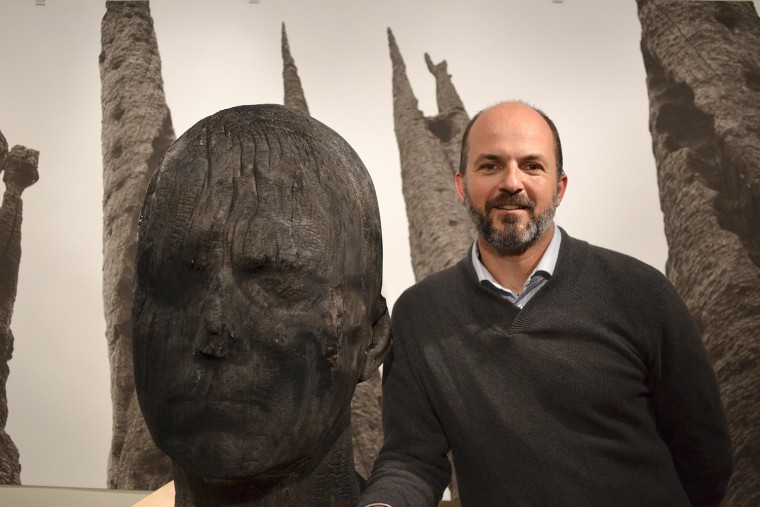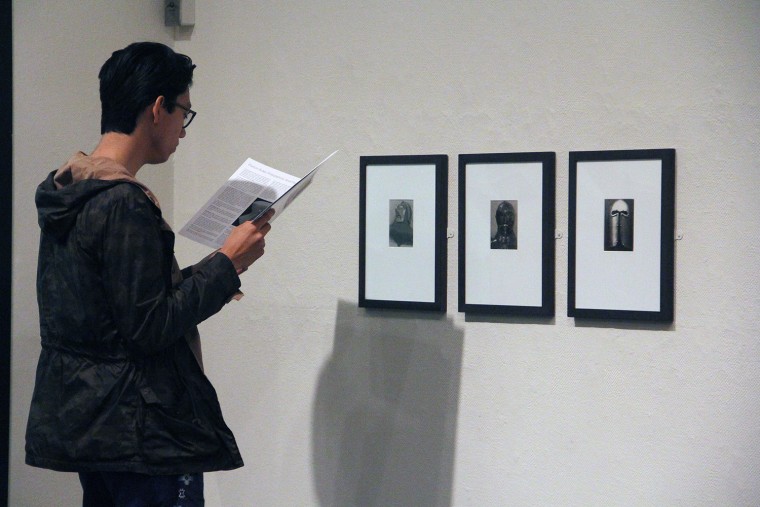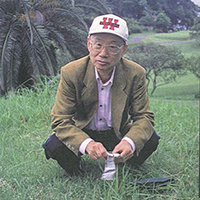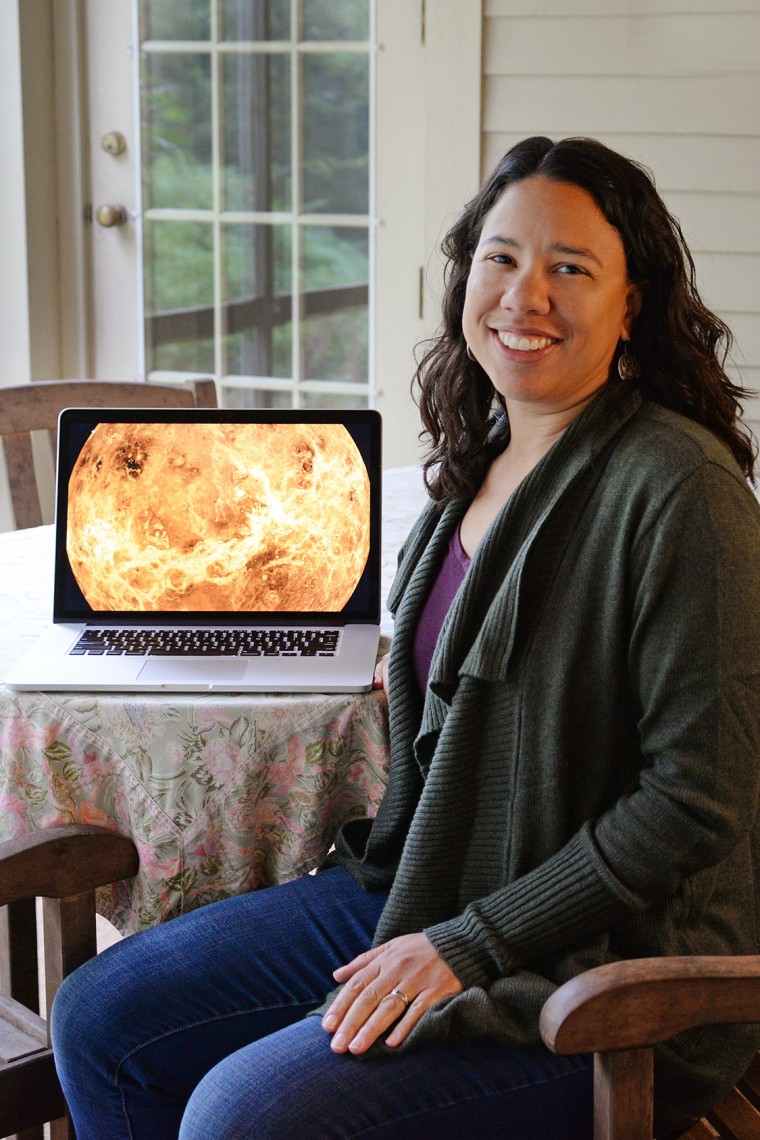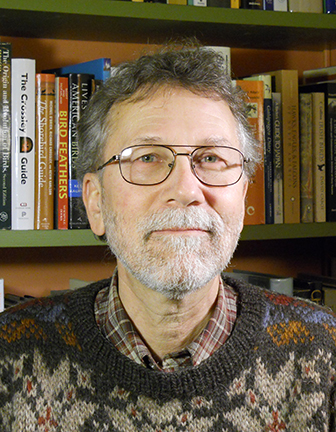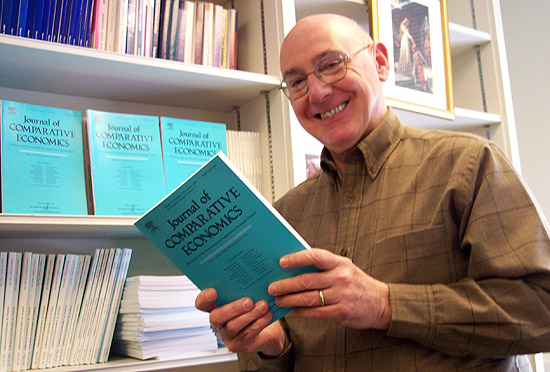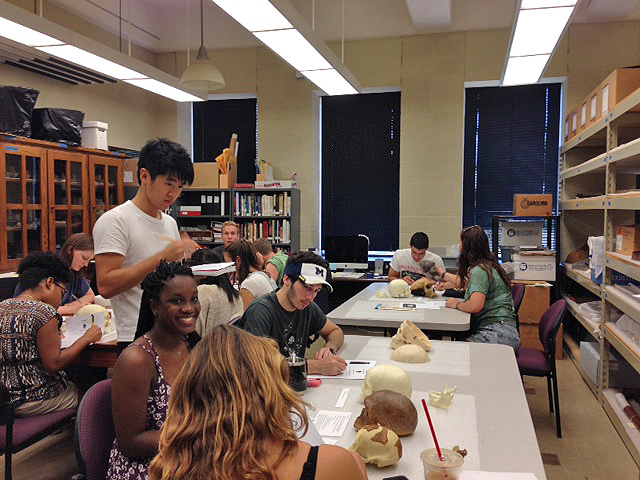On Sept. 30, artist Ian Boyden ’95 spoke about his gallery exhibition, Tripod Complex, now on display at the Mansfield Freeman Center for East Asian Studies through Dec. 11. On Oct. 1, he followed up with an afternoon lecture titled “Nirvana: Carbon Inks, Burning Forests and the Buddhist Endgame.” Boyden, also a writer and director of the San Juan Islands Museum of Art, discussed how his exploration of the material and ecology of a forest fire offered him a path into further philosophical contemplations. The exhibition, Tripod Complex, (more…)
(more…)
#THISISWHY “Alexander Hamilton. My name is Alexander Hamilton.” When Hamilton writer and star Lin-Manuel Miranda ‘02 sang his first line to an audience packed to the rafters with Wesleyan alumni, faculty, staff, students, and friends, the crowd erupted in thunderous applause. Even Miranda couldn’t stifle a smile. More than 1,300 members of the Wesleyan community descended on the Richard Rodgers Theatre in New York City on October 2 as Wesleyan hosted a sold-out benefit performance of Hamilton, written by and starring Miranda (who just last week received a MacArthur Fellowship, popularly known as a MacArthur “genius grant”), and directed by…
Satoshi Omura was awarded the Nobel Prize for Medicine for developing a new drug, which has nearly eradicated river blindness and dramatically reduced mortality from other devastating diseases. Omura made the discovery that led to this drug while a visiting professor at Wesleyan in the early 1970s.
Omura has remained in touch with Wesleyan colleagues since then and in 2005 was appointed the first Max Tishler Professor of Chemistry, an honorary position. He returns to campus every few years to meet with faculty and present his current research.
On Sept. 30, NASA’s Discovery Program selected five planetary mission investigations for study during the next year as a first step in choosing one or two missions for launch as early as 2020. Wesleyan’s Martha Gilmore is on two of the investigation teams. Gilmore, the George I. Seney Professor of Geology and chair of the Department of Earth and Environmental Sciences, is an expert on terrestrial planets. She studies the morphology and mineralogy of the surfaces of Venus and Mars using data from orbiting and landed spacecraft. She also is on the Executive Committee of NASA’s Venus Exploration Analysis Group…
On Oct. 5, Phillip Wagoner, professor of art history, professor of archaeology, was named a co-recipient of the American Historical Association's John F. Richards Prize in South Asian History. The John F. Richards Prize recognizes the most distinguished work of scholarship on South Asian history published in English. Eligibility includes books on any period or field of South Asian historical studies and works which integrate South Asian history with broader global issues and movements. Wagoner shares the prize with Richard Eaton of the University of Arizona. Together, they co-authored the book, Power, Memory, Architecture: Contested Sites on India’s Deccan Plateau, 1300–1600,…
John Bonin, the Chester D. Hubbard Professor of Economics and Social Science, was the invited keynote speaker at the 5th annual CInSt Banking Workshop, hosted by the Center for International Studies at the National Research University Higher School of Economics in Moscow, Russia on Oct. 2. The theme of the conference was "Banking in Emerging Markets: Challenges and Opportunities." Bonin's talk was titled, "Did foreign banks 'cut and run' or stay committed to emerging Europe during the crises?" Bonin presented research he did together with Dana Louie '15. They examined the lending behavior of foreign banks during the global financial crisis and at the onset…
Charles Sanislow, associate professor of psychology, associate professor of neuroscience and behavior, published findings from his laboratory titled “Ratings for Emotion Film Clips,” in Behavior Research Methods (Volume 47, Issue 3, pages 773-787) in September 2015. Co-authors included former post doc Crystal Gabert-Quillen (now on the faculty at Middlesex Community College in New Jersey); Ellen Bartolini '11 (currently a graduate student in clinical psychology at Widener University); and Benjamin Abravanel '13 (currently a graduate student in the clinical science program at the University of California—Berkeley). In mood induction studies Sanislow and his students were piloting in the lab, they noticed that film…
Ellen Thomas, the University Professor in the College of Integrative Sciences, research professor of earth and environmental science, is the co-author of two recently published papers. They include: "Microfossil evidence for trophic changes during the Eocene–Oligocene transition in the South Atlantic (ODP Site 1263, Walvis Ridge)," published in Climate of the Past, Volume 11, pages 1249–1270 in September 2015 and "Changes in benthic ecosystems and ocean circulation in the Southeast Atlantic across Eocene Thermal Maximum 2," published in the journal Paleoceanography, Volume 30, pages 1059-1077 in August 2015. "Microfossil evidence" describes changes in organisms living in the oceans during a major change in the…
Writing at Wesleyan presents the Fall 2015 Russell House Series of Prose and Poetry. All events are free and open to the public. M. NourbeSe Philip and Professor of Anthropology Gina Athena Ulysse will speak at 7:30 p.m. Oct. 15 in Memorial Chapel. NourbeSe Philip is a Toronto-based poet, essayist, novelist, and playwright. Her most recent poetry collections are She Tries Her Tongue, Her Silence Softly Breaks, which has been reissued by Wesleyan University Press, and Zong!, also published by Wesleyan. Her essay collections include A Genealogy of Resistance and Showing Grit. Ulysse has performed her one-woman show "Because When God…
On Sept. 16, students enrolled in the PSYC221 Human Memory course used the Wesleyan University Archaeology and Anthropology Collections for hands-on learning. The class, taught by Erika Fulton, visiting professor of psychology, visited the collections to learn more about memory and the brain. Students compared and contrasted three skulls from disparate time points in human evolution and used their observations to make inferences about how different parts of the brain must have evolved. "They had to think about the relationships among a changing environment, memory demands, and brain lobe development," Fulton said. "I think it was a fun way for them to…
On Sept. 29, Wesleyan hosted the annual Eat Local Challenge. This one-day only event challenged the Bon Appétit Management Company staff to create a midday meal entirely from products and ingredients harvested within a 150-mile radius of the campus. The meal included produce, meat, fish and other ingredients from local farmers, ranchers, food crafters and fishermen. The lunch menu incorporated items such as corn on the cob from Horse Listener’s Orchard in Ashford, Conn. and clams and mussels provided by Ipswich Seafood in Ipswich, Mass. Kenian’s Grist Mill’s fried haddock from Yuscabog, R.I. and Szawlowski Farms’ potatoes from Hartfield, Mass. combined…


